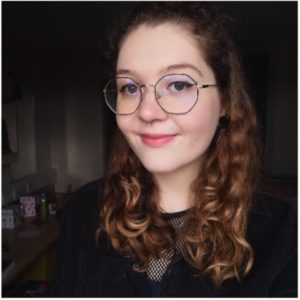New Voices 2020/21 Student Year in Review – Elisabeth Nagy
Category: New Voices
This New Voices 2020/21 Student Year in Review Case Study was written by Elisabeth Nagy, a current Museum Studies student at the University of Glasgow and CILIPS Students & New Professionals Community committee member.
 Hi! My name is Elisabeth (she/her) and I am part of the Elizabeth power duo that works as Event Coordinators for the Students and New Professionals Community at CILIPS. At the moment I am finishing my postgraduate degree Museum Studies at the University of Glasgow, which, for the first time ever, is CILIP-accredited, too.
Hi! My name is Elisabeth (she/her) and I am part of the Elizabeth power duo that works as Event Coordinators for the Students and New Professionals Community at CILIPS. At the moment I am finishing my postgraduate degree Museum Studies at the University of Glasgow, which, for the first time ever, is CILIP-accredited, too.
Coming from a publishing background, I used to work as a school librarian in my German hometown Rostock. In 2020 I then decided to study Museum Studies in order to gain a solid understanding of other cultural institutions and how they are run, so I moved to Scotland in the summer.
The Museum Studies course is designed to learn about all GLAM institutions (galleries, libraries, archives and museums) – the focus hereby is definitely on museums, though, so keep that in mind if you are thinking about studying it! I learned about the details of exhibition planning, collection management, the moral questions museums face (especially in regards to repatriation – which the vast majority is in favour of!), engagement ideas and accessibility issues. In a library or archival context, this is also really useful as special collections are made more and more accessible every day, especially through digital efforts.
Usually, Museum Studies at Glasgow Uni is known for being very hands-on as classes are taught at Kelvinhall and students get the opportunity to gain work experience at institutions like the Hunterian Museum or the National Library. This year, due to COVID-19, the university museum staff and teachers have equipped us with supplementary videos on object handling, storage policies and guest talks over Zoom instead of visiting exhibitions together as a course. Despite these disadvantages, this year has definitely made me more resilient and I have a lot more knowledge on different computer software than last year. We are hoping to catch up with some practical object handling sessions over the summer if restrictions continue to ease – all going well, and only if it is safe to do, of course!
I personally regret not having had the chance to get some work experience at a Scottish library, even though I truly value the in-depth knowledge I now have about collections management and audience engagement, which can be applied to libraries just as easily. I am currently trying to teach myself more UK-specific library science knowledge, and the biggest help so far was becoming a part of CILIPS! If you feel like you don’t know where to begin your journey into librarianship – the free events hosted by CILIPS are incredibly helpful, e.g., the SNPC’s Career Event from last year in which Heather Marshall lined out exactly how to structure a CV – something I now follow quite a lot as I am writing applications myself. Additionally, I would recommend working in other places before you undertake a postgraduate qualification – such as in supermarkets, charity shops or as a receptionist. Visitor engagement, stock management and record keeping are skills that are applicable in many places, and finding out for yourself if these kinds of day-to-day tasks are the right thing for you is really valuable.
If you are thinking about doing an online course like mine, remember that usually, university is not about sitting in front of a screen all day, every day. While an online course will teach you self-discipline and how to organise your workload, working at home also removes this barrier of relaxation and a work space. This can lead to an immense amount of stress and imposter syndrome if you are a bit of a perfectionist like myself. Structure your days into three chunks: If you work one chunk, you are doing well, two chunks of work are for emergencies, and never work three. Another piece of advice would be to create a group chat with everyone from your course right from the start, as this really helped our course to keep our heads up and stick together!
I hope that in the ‘new normal’, this environment of more understanding for having a hard time will continue, and the realisation that in fact, visiting a museum or a library is still something that cannot be copied, even though “everything is online anyway – why would we need librarians in the future?”. Cultural spaces are inherently social and I cannot wait to start working in a Scottish library soon to get this feeling back!
If you want to hear more about my course or have an idea what you would really like to see as an event hosted by the SNPC, just get in touch! My twitter handle is @elisabeth_na